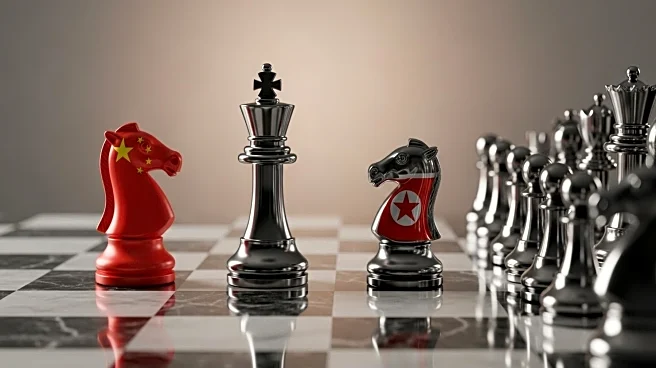What is the story about?
What's Happening?
During a recent military parade in Beijing, North Korean leader Kim Jong Un received significant diplomatic attention, standing alongside Chinese President Xi Jinping and Russian President Vladimir Putin. This event marked a potential shift in China's stance on North Korea's nuclear ambitions. For the first time, official communications from a summit between Xi and Kim omitted any mention of denuclearization, suggesting China's tacit acceptance of North Korea as a nuclear power. This development contrasts with China's previous support for UN sanctions against North Korea and its historical advocacy for a denuclearized Korean Peninsula.
Why It's Important?
China's apparent shift in policy could have significant implications for regional security and global nonproliferation efforts. By potentially accepting North Korea's nuclear status, China may be prioritizing its strategic interests over global nonproliferation norms. This move could embolden other countries to pursue nuclear capabilities, destabilizing the Asia-Pacific region. Additionally, it may complicate U.S. efforts to manage North Korea's nuclear threat and could influence the dynamics of U.S.-China relations, particularly in the context of the ongoing strategic rivalry between the two nations.
What's Next?
The international community, particularly the United States and its allies, may need to reassess their strategies in dealing with North Korea's nuclear ambitions. The U.S. might consider diplomatic re-engagement with North Korea, as previously attempted by President Trump. Meanwhile, regional powers like South Korea and Japan may face increased pressure to develop their own nuclear deterrents, especially if doubts about the U.S. nuclear umbrella persist. China's actions could also lead to closer trilateral cooperation with North Korea and Russia, further challenging the existing global order.
Beyond the Headlines
China's shift could reflect a broader strategy to reshape the global order, reducing U.S. influence in the Asia-Pacific region. This development may also signal a new phase in China-Russia-North Korea relations, potentially leading to increased military and economic cooperation among these nations. The situation underscores the complex interplay of geopolitical interests in the region and highlights the challenges of maintaining global nonproliferation norms in an era of great-power rivalry.















